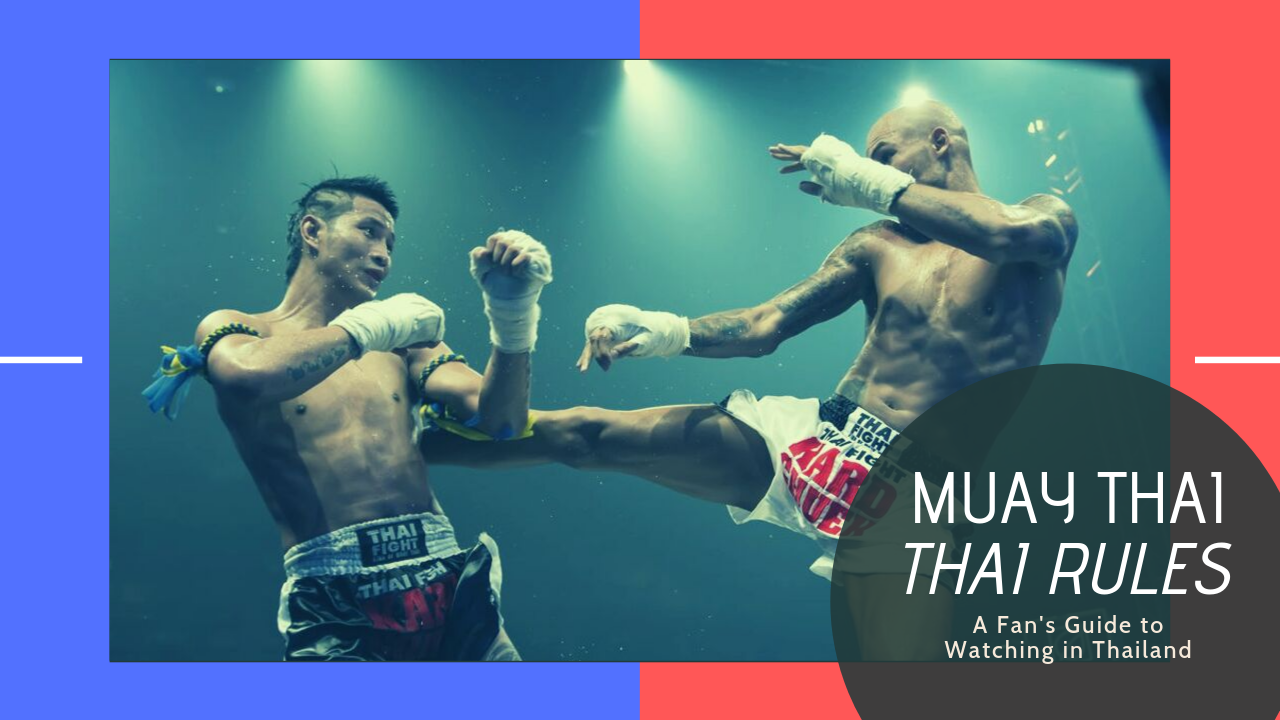How To Watch a Muay Thai Fight

THE CONFUSING RULES OF MUAY THAI IN THAILAND
By Saks

This article is an attempt to try to explain the rules to watching a Muay Thai match. Now this is a feat that is quite more complicated than you would expect due to the evolution of rules which may, or may not be dictated by the current state of gambling in Thailand.
The Basic Rule Set
- A Muay Thai match consists of 5×3 min rounds with a 2 min rest in between rounds
- Each round is scored with a total of 10 points, which is accumulated for the total of 5 rounds to equal 50 points, unlike boxing where it’s scored in individual rounds.
- Points are scored according to clean strikes; punches, kicks, elbows, knees and sweeps. Kicks, elbows, knees, sweeps, and a dominant clinch score more points than a clean punch, unless the punch results in a knockdown or does visible damage.
- When locked up in the clinch both fighters will battle for the dominant position. When knees are executed in the clinch they must be countered or else the fighter who executed more knees will score more. If a sweep is executed and both fighters fall the fighter who lands on top gets the advantage.
- Clean hits should always be countered or else your opponent will receive the point, this is most often seen with kicks to the body, this is also the main reason Thai trainers make you do a ridiculous amount of kicks in a row, called “buern” or double in Thai. This is not only meant to build stamina but also to condition you to return kicks in rapid succession.
The Not-So Basic Rules
Power shots called “luk kangrang” score more.
Basically, if your opponent attacks you but you do not show any reaction, that is NOT a power shot. But, if you attack your opponent and he shows a visible reaction (such as flinching) this will score to your favor. This aspect of the fight is often overlooked by viewers who are not familiar with the scoring system.
Another often misunderstood point is the role of dominance.
A friend of mine who was a foreign fighter fighting in Thailand a couple years back had lost a fight due to the ref calling it off. He was quite confused by how the fight had ended. He was knocked down and the referee starting counting, once the referee reached the 8 count he called the fight off. The fighter explained to me that he was fine but he was using the whole count to catch his breath.
That’s a BIG mistake right there. Slowly answering the 8-count is a prime example of the dominance role in Muay Thai.
You’ll often see Thai fighters get knocked down or sweeped and they’ll immediately bounce back up almost like a spring and continue to charge. Fighters do this because they do not want to show any weakness. The moment weakness is shown the fight is scored in favor of the more dominant fighter even if he’s been losing for most of the round.
You know how you see fighters raising their hands at the end of the rounds even when they are obviously losing? This is not done because of cockiness or to psyche themselves up, it is in fact done to show the judges as well as the gamblers that they are fine and still ready to rumble.
The 1st Round
Let’s now talk about the first round and the second round, two rounds that seem to most confuse spectators of Muay Thai.
Most casual fans will notice that most of the action in a Muay Thai match takes place during the third and fourth rounds…. why is that?
Well, the first round is considered the feeling out round (the reasoning behind this is a little controversial).
One perspective is that traditionally Muay Thai fighters did not prepare for specific opponents, they would just always be training in general. So fighters often use the first round to figure out their opponent’s style.
The more controversial perspective, and the one that is often true in the major stadiums such as Rajadamnern and Lumpinee, is that the slow pace of the first round is for the gamblers to see the styles and the readiness of the two fighters so they can choose whom to bet on. Gambling in Muay Thai works by rounds and the odds constantly change.
The 5th Round
In the fifth round fighters will start slowing down and often touch gloves. The winning fighter will try to touch gloves with their opponent. If their opponent touches back that means they concede defeat.
For the last round, the more traditional honorable perspective is that a Muay Thai match should be looked at as a battle or a strategic war. If you use this comparison most battles throughout history do not end in complete annihilation or obliteration of the opponent but often in surrender or complete dominance.
A Muay Thai fighter will find it more embarrassing to be completely dominated by their opponent for five rounds then to be knocked out in the first round or last round. This is due to the fact that knockouts often occur due to mistakes, such as letting your guard down or underestimating your opponent. This is believed by a fighter to be their own fault and not because the skill or dominance of their opponent.
But when you throw everything you have at your opponent and are completely neutralized, this is a HUGE sign of weakness or defeat. It shows that your opponent is obviously more skilled and just plain better than you.
The more controversial perspective and one of the downfalls of the current state of Muay Thai is once again related to the gamblers. A last minute Hail Mary knockout is often considered luck, but this is something that would often cause fits for bookies and gamblers.
Spending major part of my childhood in the United States as an athlete you’re always taught that it isn’t over till the fat lady sings, you give your all till the end. I find this quite interesting and an obvious difference in cultures. Muay Thai and Thai culture teaches humbleness in defeat and the fact that losing isn’t the end of the world. I do not feel that either view is right or wrong just different.
This was my attempt to give a brief description of the not-so obvious rules of a Muay Thai match. I hope it was helpful!
Now forget half of what you just read because like the great Samart mentioned in a recent interview, due to the role of gamblers in the Muay Thai world, the results and scoring of many fights these days have become perplexing.
Feed Your Muay Thai Addiction!
Join our "Muay Thai Mondays" email newsletter for the latest updates on new videos, special events and everything Muay Thai!







